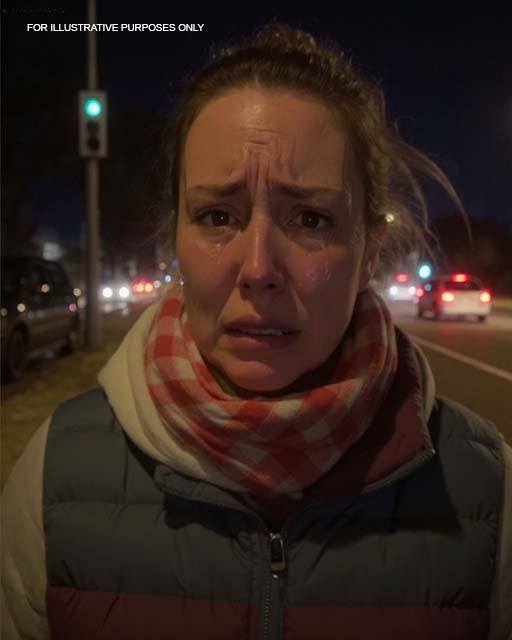Before everything fell apart, I used to think marriages eroded slowly, like a shoreline worn down by waves you hardly notice. But with us, the change wasn’t subtle. It hit like a sharp gust of wind that cut straight through my sweater.
My husband, Julian, had once been the man who warmed my hands in grocery store parking lots and left notes in my lunch bag reminding me to eat something beyond toast.
After our daughters were born, he changed. Not overnight, but steadily enough that I couldn’t pretend I didn’t see it. His eyes no longer lingered on mine when he came home. His “hello” became a distracted grunt. His affection, once casual and effortless, grew transactional.
He became distant, like I’d transformed from his wife into just another piece of furniture he walked past without noticing.
Then the snapping started.
If I forgot to take out the trash, he’d say, “You had all day, Olivia. What exactly were you doing?”
If the girls made a mess, it was, “You let them walk all over you. No discipline.”
If dinner wasn’t hot enough, or I used the wrong detergent, it always circled back to being my fault.
Soon, arguments felt like walking through a minefield. One wrong step, one wrong word, and boom—another explosion that left me picking up pieces for days.
The day everything changed, we were driving back from his mother’s house. The girls were asleep in the backseat, and I dared to hope we’d make it home peacefully.
Thirty miles from home, we stopped at a gas station. “Grab me one of those burgers inside,” he said. “Make sure they add mustard.”
Inside, I found the burgers, but the cashier apologized: “Sorry, ma’am. We’re out of mustard packets.”
I told Julian. That was all.
But he looked at me like I had ruined his entire day. A muscle pulsed in his jaw. He muttered sharp remarks as he pulled back onto the highway, growing louder, sharper, careless.
The insults piled up. The girls snored. I sat there, small, shrinking, wondering when he had started hating me.
Then, at the outskirts of town, he slammed the brakes, my seatbelt locking. We were in a Target parking lot I didn’t recognize. He leaned across and shoved the door open.
“Get out.”
“What? Julian—”
“You heard me. I’m done with this. Walk. Maybe you’ll think about why I’m fed up.”
The girls stirred. “Daddy? Where’s Mommy going?”
He didn’t look at them. Didn’t look at me. He shut the door and drove away.
I stood frozen. Alone. Thirty miles from home. No wallet. Dead phone. No ride.
A lump formed in my throat. I forced myself to breathe. You’re okay, Olivia. You can think. You can figure this out.
I found a bench near a stretch of trees separating Target from a sidewalk. An older woman sat at the far end. Elegant, silver hair in a smooth bun, pearl earrings, sunglasses despite the fading light. A sleek cane rested against her knee.
She glanced at me. Calm. Sharp.
“Bad day?” she asked gently.
“My… husband. He just drove off. Left me here.”
“On purpose?”
“Yes. Very much on purpose.”
“And no way home?”
“No phone, no money, nothing.”
She studied me. “No. You look like someone who’s reached the end of a rope someone else has been tightening.”
“I’m Marjorie,” she said.
“Olivia,” I replied.
“Well, Olivia, if you’ll allow the company of an old woman with a taste for meddling, I can take you home—or wherever you like.”
I hesitated. “You don’t even know me.”
“I know enough,” she said. “The universe put us on the same bench today. I don’t argue with the universe.”
She tapped her fob. A sleek black Mercedes flashed its lights. “Come along.”
Something about her presence—confidence, kindness, steady assurance—made me trust her.
In the car, she asked gentle questions. “How long has he been treating you like this?”
“A while. Years, really.”
“Support? Family? Friends?”
“My parents moved. Friends are busy.”
She nodded. “I understand more than you say.”
At my street, she handed me a cream-colored card with a number. “Call me when you’re ready. You deserve better.”
I held it, trembling. “Thank you.”
That night, I called. Marjorie answered. “I hoped you would. We start tomorrow. Café on Oakridge at ten.”
The next morning, she gave me a plan:
Reclaim myself: therapy, resume updates, personal space.
Boundaries: real ones.
The shift would be visible to him when it was too late.
It wasn’t revenge. It was reclamation.
Small changes: waking early, walks, one new blouse that made me feel like me. Therapy. Jobs. A junior assistant position at a local design firm. My first paycheck felt like oxygen.
Julian noticed the shift slowly. I was calmer, assertive, less eager to absorb his moods. Criticism? I left the room. Raised voice? I raised an eyebrow.
Two months later, he noticed. “Liv… you’ve been… different.”
I paused. Silence. Powerful.
“You abandoned me thirty miles from home,” I said. Calm, even. “Our daughters watched.”
He flinched. “I was angry.”
“So was I. But I didn’t throw you out.”
Two days later, I packed a suitcase. “Taking the girls to my aunt’s. We need space.”
Julian called, texted, apologized, begged. But something inside me had shifted permanently. The rope he had tightened for years finally snapped.
Three months later, separation finalized. He cried. I did not.
When I saw Marjorie again, I hugged her. “Look at you. Standing tall,” she said.
“I think I am,” I replied.
“You didn’t just make him regret it. You saved yourself.”
And for the first time in years, I believed it.
